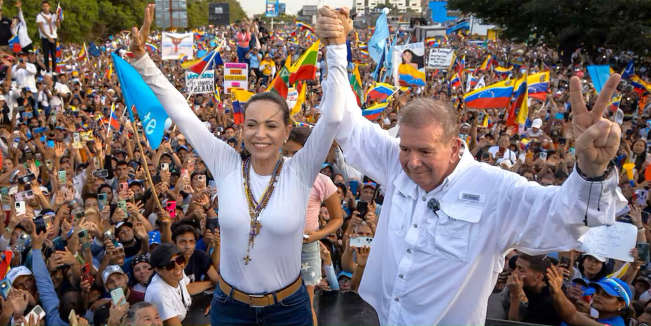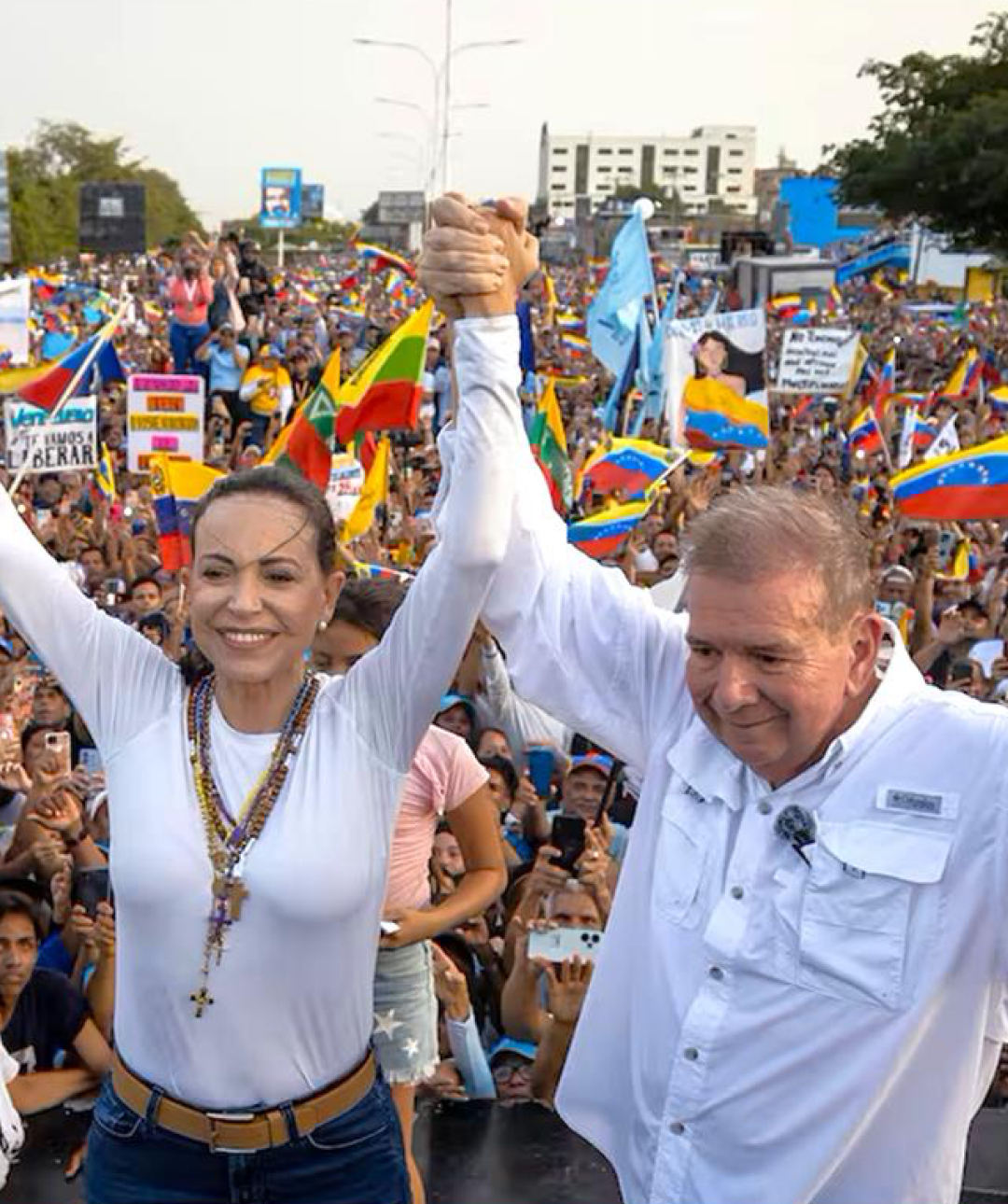

NEW YORK (July 31, 2024) — The Human Rights Foundation (HRF) reiterates its strong condemnation of dictator Nicolás Maduro’s fraudulent proclamation as Venezuela’s reelected president. The regime-controlled National Electoral Council (CNE) announced Maduro’s electoral victory on the evening of July 28 after hours of uncertainty and an interruption in data processing. Two days later, the regime has not yet provided evidence to support their electoral claims.
Meanwhile, the opposition campaign led by presidential candidate Edmundo González Urrutia and María Corina Machado organized a well-coordinated effort to collect all voting backup information to sustain the official result of the presidential election. With 81.21% of the official ballot tally sheets collected and made public on two websites — one where the world can see the latest numbers and another where Venezuelans can verify their actual votes — the opposition has credibly shown its wide-margin victory with 67% of the national vote versus Maduro’s 30%.
“Maria Corina Machado has inspired a tidal wave of unity for Venezuelan democracy. The people of Venezuela have had enough and they deserve the support of democrats from around the world,” HRF Chair Yulia Navalnaya said. “Victory over dictators like Maduro is never quick and it is never easy. It will be a hard road and the international community must seize this opportunity to stand by the Venezuelan people. This is the moment for Venezuela,” Navalnaya added.
The blatant violations of the rules aimed at guaranteeing the fairness and integrity of the electoral process began long before the election. Between January 1 and July 28, 183 opposition members were arbitrarily detained in connection with campaign activities, including Machado’s head of security. Maduro also backtracked on his Barbados Agreement commitment to allow independent international observers to monitor the voting; only the Carter Center and regime allies were permitted to conduct observation activities. At 11:08 p.m. on July 30, after its representatives left Venezuela, the Carter Center issued a statement concluding that the elections “did not meet international standards of electoral integrity and cannot be considered democratic,” and that “[t]he Carter Center cannot verify or corroborate the results of the election declared by the National Electoral Council (CNE), and the electoral authority’s failure to announce disaggregated results by polling station constitutes a serious breach of electoral principles.”
The regime also severely restricted the voting rights of the more than seven million Venezuelans living in exile and made their participation impossible. Out of the more than 6.5 million Venezuelans that would be eligible to vote, only 69.000 were registered. Two days before the election, the regime suddenly shut down its border with Colombia, where three million Venezuelan refugees reside, to stop them from returning to cast their votes at home.
The voting was conducted in an overall peaceful atmosphere, despite documented reports of regime-backed armed strike groups (colectivos) harassing people at many voting centers. The democratic opposition also denounced that in several voting centers, witnesses were not allowed to enter, and regime loyalists and security officials severely impaired their work. However, after the polls closed, it became clear that across Venezuela, the people had largely supported the Machado and González Urrutia camp, while the regime worked on subverting the counting process. Immediately after the counting was set to begin, Delsa Solorzano, chief monitoring official of the opposition, denounced that she and her team were not allowed to access the central processing center and that the CNE had halted the transferring of information from multiple centers.
Soon after the polls closed, the president of the regime-controlled National Assembly, Jorge Rodríguez, despite not being able to share results before the first official report by the CNE, said at a press conference that they were allowed to “make faces,” displaying a big smile and stating that the election was “a triumph over the aggressors.”
While the uncertainty grew, a few regime loyalists and authoritarian allies across Latin America began sharing false exit polls that showed a significant advantage for Maduro over Gonzalez Urrutia. It was quickly revealed that a fabricated consultancy agency had published this false information to manipulate the expectations of the results. There was no public record of the existence of this polling firm, and its website had been created less than three weeks before the election, while its X profile was created only nine days before Venezuelans headed to the polls.
The release of official results was delayed by six hours without explanation despite an electronic voting system that should allow expedited results. The opposition began collecting as many official tally sheets as possible while facing severe obstacles, including the removal of ballot boxes by security officials. Before any results were published, Diosdado Cabello, vice president of the regime’s PSUV party and long-time high-ranking official of the dictatorship, began to set the stage for what was about to come. After stating that they were willing to accept the information from the CNE, Cabello accused the opposition of attempting to subvert the election and that any claims of fraud were premeditated and false, with an already triumphalist tone.
Following hours of uncertainty, the CNE released a first round of results that was allegedly based on 80% of all voting records and gave Maduro the victory with 51.2% of the votes over Gonzalez Urrutia with 44.2%. The head of the CNE, Elvis Amoroso — who was also the one responsible for the arbitrary disqualification of Maria Corina Machado and Corina Yoris as presidential candidates — declared that the results reflected an irreversible trend that allowed them to declare the reelection of Maduro. The publication of the results did not include any official information or documentation. No voting records were shared, and the CNE website remained out of service from the evening of July 28 until the end of the following day. At the same time, the opposition was sharing the voting records, which it was able to collect slowly, denouncing that they reflected a completely different scenario and that the CNE needed to provide evidence on the origin of the results.
“The world witnessed one of the worst and most grotesque cases of election fraud,” HRF Chief Executive Officer Thor Halvorssen said. “The regime must accept the overwhelming demand of the Venezuelan people for change after years of suffering under autocratic rule. The international community needs to step up its efforts to uphold the democratic aspiration of a people that heroically went to the polls despite the challenges it’s been facing,” added Halvorssen.
On the morning of July 29, in the face of an evident fraud perpetrated by the regime, Venezuelans organically began to fill the streets of the country in protest. In the evening, Machado and Gonzalez Urrutia shared that the opposition was in possession of 73% of all official tally sheets, allowing them to claim victory with documentary evidence. As of 8.40 p.m. ET on July 30, 81.21% of all tally sheets had been collected, showing that 67% of the national vote had gone to González Urrutia. This willingness to make evidence available to the public is in stark contrast with the CNE’s opaqueness, as 48 hours after the vote, it is still refusing to share any official documentation to back its proclamation of Maduro.
Immediately after Maduro’s fraudulent reelection proclamation, nine Latin American countries released a statement calling on the regime to publicize the information that backed the results allegedly certified by the CNE. This was followed by the Carter Center’s release calling for the immediate release of official documentation, claiming that its technical mission on the ground cannot complete its report without this information.
On the morning of July 30, the OAS Department of Cooperation and Electoral Observation released a detailed report documenting the irregularities throughout the run-up to the election and during the day of the voting. The regional body cited a wide range of violations perpetrated by the regime throughout the period and the worsening atmosphere for freedom of the press, assembly, and expression in the country. Based on the lack of documentary evidence and information on the origin of the results provided by the CNE, the OAS concluded that “the official results don’t merit trust nor should they receive democratic recognition” after declaring that “the regime of Nicolás Maduro once again has betrayed the Venezuelan people.”
Following the precedent of the widely questioned 2018 elections in Venezuela and the regime’s cooptation of all government institutions — including the CNE and the judiciary — the massive fraud that has been perpetrated by the Maduro regime in Venezuela is a scandalous and yet unsurprising new attempt by the regime to cling to power and to prevent the peaceful democratic transition that Venezuelans demanded overwhelmingly on Sunday. The repression of the post-election protests has already left at least six dead and more than 130 people arbitrarily detained, and many reportedly tortured, including prominent opposition leader Freddy Superlano, while Maduro’s henchmen Tarek William Saab and Jorge Rodríguez have already publicly called for the regime to arrest and imprison both Machado and González Urrutia.
HRF strongly condemns the overt attempt by the Maduro regime to perpetuate itself in power despite the clear message the Venezuelan people sent with their votes. The international community must work together to support those fighting to bring back democracy to Venezuela and to hold those responsible for years of authoritarianism and gross human rights violations accountable.
The Human Rights Foundation (HRF) is a nonpartisan nonprofit organization that promotes and protects human rights globally, with a focus on closed societies.
For interview requests or media inquiries, please email [email protected].
Hit enter to search or ESC to close